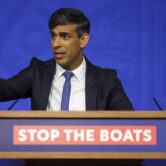(CN) — Is a war about to break out in Ukraine?
It's a question ringing out in Europe with increasing urgency as tensions build between Russia and NATO-backed Ukraine despite the approach of winter.
For the past three weeks, the conflict has escalated dangerously after Russia sent more than 90,000 troops to the Ukrainian border, a move causing alarm bells to ring in Kyiv and the NATO alliance. Ukraine warned of an imminent invasion, the second such warning this year after a similar buildup took place in April.
For its part, Russia has accused NATO of arming Ukraine in violation of a ceasefire deal meant to stop the seven-year conflict in eastern Ukraine. Russia also appears to be responding to attacks, including a strike by a drone sold to Ukraine by NATO member Turkey, against pro-Russian separatists in the Donbas region of Ukraine.
Ukrainian President Volodymyr Zelensky is stoking tensions too by pushing to become a NATO member and, despite campaign pledges to seek an end to the conflict in eastern Ukraine, vowing to retake Crimea, which Russia illegally annexed in 2014, and the breakaway eastern regions. Zelensky is also accused of disregarding terms laid out in the ceasefire deal struck in 2015, the so-called Minsk II agreement, that stipulated allowing Donbas to gain political autonomy. More than 14,000 people have been killed in the Donbas conflict and about 1.5 million people have been displaced.
The United States and its NATO allies are warning the Kremlin of severe consequences if it attacks Ukraine. NATO foreign ministers, including U.S. Secretary of State Antony Blinken, are meeting in Latvia to consider their options.
“Today, we can no longer take our peace and security for granted,” said Jens Stoltenberg, the NATO secretary general, on Tuesday. “The Russian regime is aggressive abroad and oppressive at home. Its military buildup on Ukraine’s borders is of concern.”
The Kremlin denies any intention to invade Ukraine and many experts believe Russian President Vladimir Putin won't try such a reckless move, one that could lead to a prolonged and bloody conflict and leave Russia even more shunned economically and politically.
Still, some analysts wonder if Putin has reached the conclusion that Russia has no option but to move against Ukraine militarily to stop NATO from building military infrastructure in Ukraine and incorporate it into the military alliance.
The Biden administration is throwing its support behind Ukraine. In September, President Joe Biden hosted Zelensky at the White House and said the U.S. firmly stands behind Ukraine.
In October, U.S. Defense Secretary Lloyd Austin visited Kyiv to show American support. The U.S. has provided Ukraine with about $2.5 billion to arm itself since Russia annexed Crimea in 2014 following the overthrow of a pro-Russian government in Kyiv.
Earlier this month, Blinken brought Ukrainian Foreign Minister Dmytro Kuleba to Washington and signed the U.S.-Ukraine Charter for Strategic Partnership, pledging an “ironclad commitment to Ukraine’s sovereignty and territorial integrity.”
This year, NATO has stepped up its activities in defense of Ukraine. The U.S. has sent three warships on drills into the Black Sea, deployed bombers close to Russia's borders and given two U.S. Coast Guard patrol boats over to the Ukrainian navy. The Biden administration has talked about providing Kyiv with military advisers and the United Kingdom has promised to send 600 special forces if war breaks out, according to news reports. In the meantime, Ukraine is being supplied with anti-tank, anti-armor missiles and mortars and military drones from Turkey.
For the Kremlin, NATO involvement in Ukraine is viewed with deep concern and as an incursion into Russia's “sphere of influence.” Putin recently warned NATO against crossing “red lines” in Ukraine.









